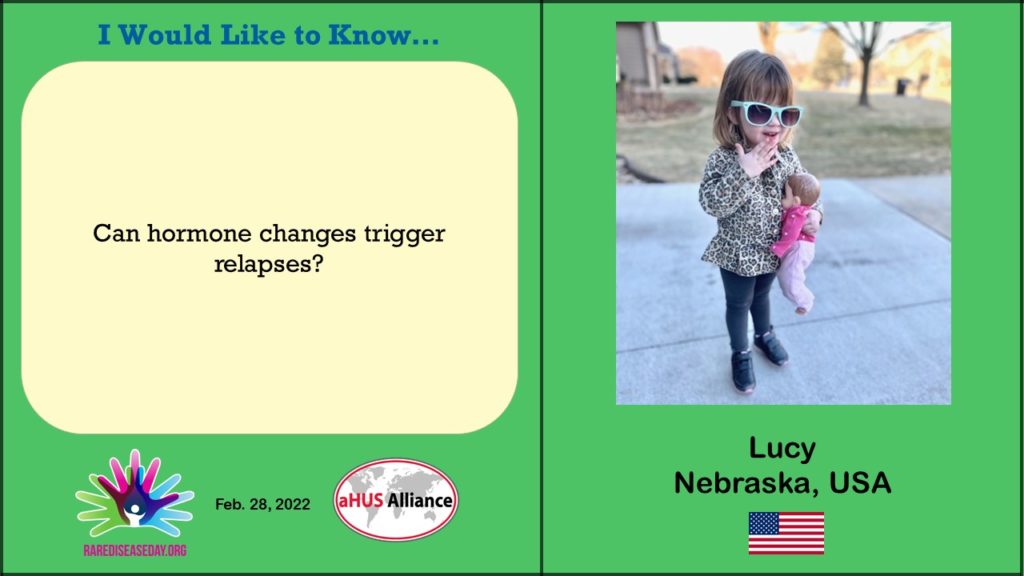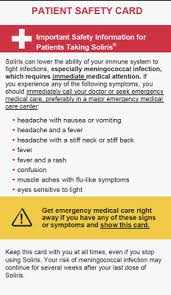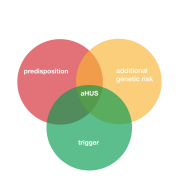Questions about hormones and aHUS in the RDD2022 video.
It is a feature of aHUS that it becomes more common in females after puberty and during pregnancy. Both puberty and pregnancy are events in which there are natural occurring hormonal changes. But why would hormone fluctuations be able to trigger aHUS asks Lucy.
Estrogen is a group of hormones that play an important role in the normal sexual and reproductive development in women. It begins to have an effect in puberty.

In pregnancy there are further hormone changes , estrogen is involved as well as progesterone, Both increase during pregnancy.
But what happens in puberty and pregnancy is a natural and common event. aHUS is rare . Why would a hormones be a target of Complement. Hormones are chemical substances in the blood that carry signals from one part of the body to another to do something. But they are not foreign invaders in the blood which Complement would detect and which could lead to uncontrolled activation in someone who is susceptible to aHUS.
So is it just coincidence? Many years ago it was suspected that birth control pills triggered an aHUS TMA. The pills were made from estrogen. But no evidence that such aHUS resulted from this trigger as the women were also found to have symptoms of a flu like illness, which could also have been the trigger. Rarely is the pill mentioned to day as a trigger of TMA but it is seen as a risk factor for VTE ( venous thromboembolism ) and not due to estrogen, nor progestin, a synthetic form of progesterone, which modern pills are made from.
But data shows that up to puberty aHUS is more likely to occur in boys than girls. Then after puberty it happens more in girls and in adulthood women are more likely to have aHUS than men. Particularly when pregnant or mostly after giving birth.
Pregnancy is a very “clotty” episode and it is also one in which Complement is more elevated than normal. The growing baby is seen as something with foreign cells (from the father) but there are Complement controls in the placenta protecting the baby. On giving birth the barrier is broken and cells from the baby can circulate in the mother. Complement is activated to destroy those cells. In those susceptable to aHUS their Complement can be become uncontrolled and lead to a “postpartum” aHUS.
But what about at the other end of the life cycle. When natural levels of estrogen and progesterone begin to fluctuate and drop.The menopause. Little is known about this effect as a potential trigger of aHUS. If it did have a triggering effect it certainly would be something other what could have caused the initial episode earlier in life, Amy.

There has been no evident research and few data about post menopausal women with aHUS. In aHUS Global Action’s study of the aHUS diagnosis process gender and ages of respondents were asked for. The data resulting showed that the genders and ages of the patients in the study were pretty typical of a global patient population’s gender and ages.
There were more female than male. More infant boys than girls . Equal numbers for older children. And more adult women than men.
One statistic stood out though. The number of later ( 45 years or older) onset aHUS patients participating.
There were 20 women and 2 men. Quite a margin of difference.
Was this a “social media” effect? Were older women more likely to be aware of the online study promoted through social media.
Or is this late onset in women something that needs to be looked at further using medical data in research?
Whilst there is no evident aHUS research on the menopause and the disease there is literature about Complement levels being higher and implicated in clotting in cardiovascular disease and in flares of autoimmune diseases like Lupus. That research is not translatable to aHUS.
When it comes to hormones as a trigger of aHUS there is nothing definite to say that it is no more than a coincidence that it happens more frequently at key phases in women’s life cycle.
But it could it be too much of a coincidence?
Article No. 499


